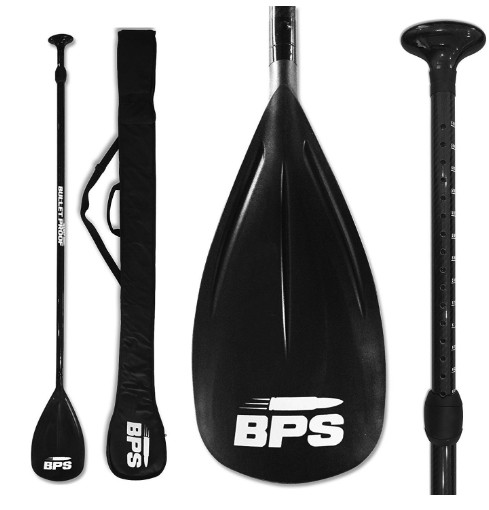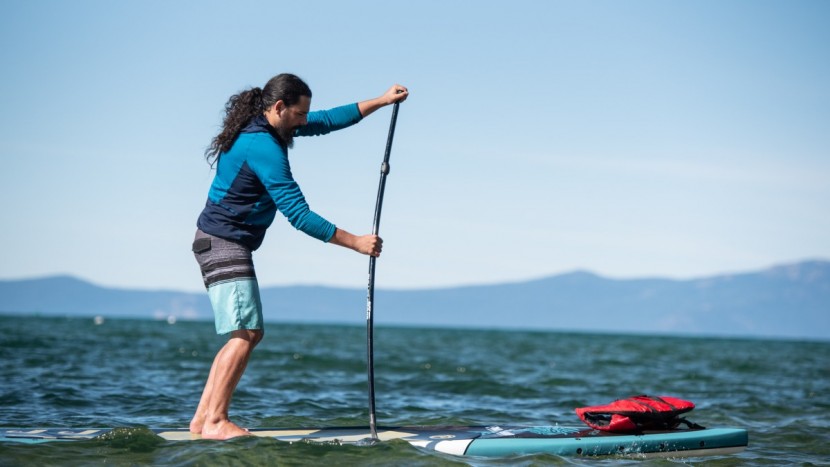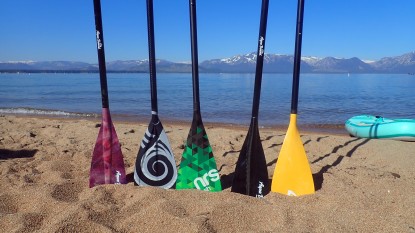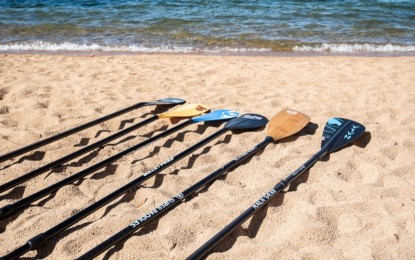Bullet Proof Surf Adjustable 2-Piece Fiberglass SUP Paddle Review
Our Verdict
Our Analysis and Test Results
While the BPS Adjustable Fiberglass paddle should be more rigid than an alloy paddle, we found this paddle to be quite flexible, exhibiting a noticeable bend if you put some effort into it while paddling. We honestly didn't notice that much of a difference between this composite paddle and an alloy one, so you might as well save some cash and get one of those if you are shopping on a budget.
Performance
Our first and most significant rating metric, Paddle Performance, accounts for 30% of the total score for the BPS Adjustable and the other paddles in this review. In this series of tests, we rated and compared how much power you can get out of the paddle, how well it catches the water, how smoothly it exits, and how it feels to recover or get set up for the next stroke. While this paddle will get you moving, it pales in comparison to the top-tier models and scored in the lower part of the group.
This SUP paddle has moderate amounts of dihedral and feels like it catches the water fairly well. We didn't get any noticeable flutter and it enters the water cleanly but it was in the power stroke when problems became prevalent. The grip is far from our favorite and the shaft of the paddle feels like it is flexing as soon as you start to put moderate amounts of power in it.
Its blade exits the water smoothly and it feels decently balanced — aside from being a little hefty — when setting up for the next stroke.
Weight
Our second assessment focused on the weight of each paddle, which accounts for 20% of the final score. While a weight difference of a pound or less may not sound — or feel — like much at first, you can definitely tell a difference between lighter and heavier paddles over marathon paddling trips. The BPS Adjustable isn't the lightest paddle we have tested nor the heaviest, falling just a bit lighter than average.
The BPS weighs around 1.7 pounds. For reference, the lightest paddles we have tried are around 1.2 pounds and the heaviest are about 2.25 pounds.
Ease of Adjustment
Next, we compared and scored how easy it is to adjust each paddle's length, which is also responsible for 20% of the final score.
This paddle feels a little clunky to adjust and is one of our least favorites to adjust on the water. You need to have it lined up perfectly both rotationally and lengthwise to get the locking mechanism to engage, which can be a bit of a pain on windy or wavy days.
Locking Mechanism
Speaking of the locking mechanism, our next metric focused solely on that, accounting for 20% of the BPS' score as well. This adjustable SUP paddles use a Twin Pin locking system, which is one of our least favorite mechanisms, earning it a relatively low score.
While this system does have a few merits — tool-free adjustment and security — it feels very hard to engage or disengage and takes a considerable amount of force. This can be quite unnerving and throw off your balance while you are on the board. The awkward grip to pull out the pins is made much worse when your hands are wet or cold. We vastly preferred the LeverLock system, though it is usually only on higher-end paddles.
Aesthetics
For the final 10% of the BPS Adjustable's score, we judged it on its looks. It did fine, but you definitely aren't making any style statements with this paddle's generic appearance. You can get this paddle with the logo on the blade printed in different accent colors but it is far from the prettiest paddle we have seen.
Value
We didn't think this paddle is a great value, as we found it fairly indistinguishable from some other less expensive paddles.
Conclusion
The BPS Fiberglass is supposed to be a slight upgrade from their alloy version for a slightly higher price, but overall we didn't really find it to be worth it.









